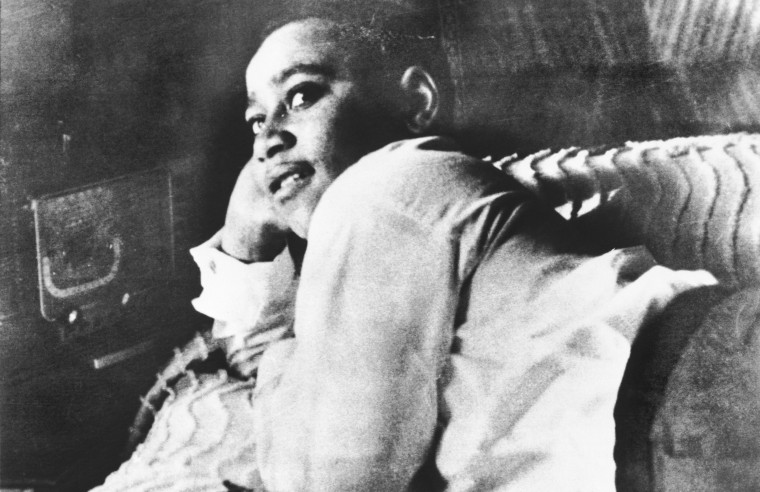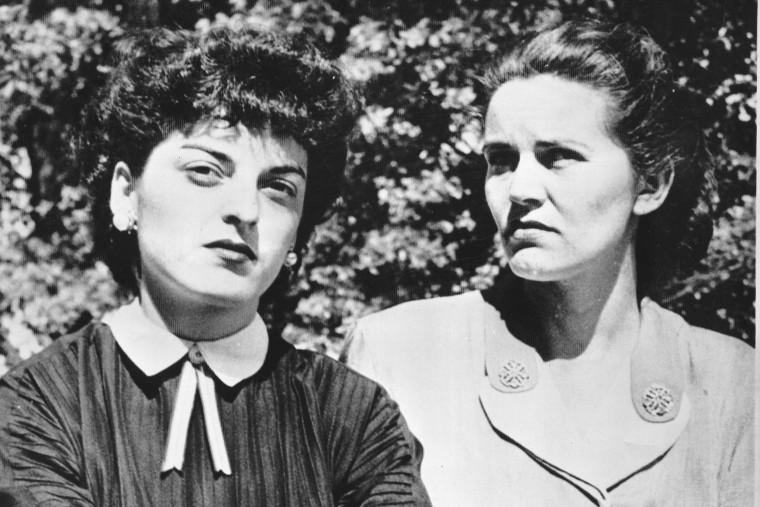Emmett Till's family disputes the version of events recounted in a recently leaked memoir by the white woman who accused Till of making unwanted advances toward her before his lynching in 1955.
The manuscript by Carolyn Bryant Donham, titled “I Am More Than a Wolf Whistle,” was obtained by The Associated Press and NBC Chicago.
In it, Donham repeats what she said during Till's murder trial, in which her then-husband Roy Bryant and his half-brother J.W. Milam were acquitted. The men, though, later admitted to killing Till.
Till, 14, of Chicago, was visiting family when he entered the store in Money, Mississippi, where Donham, then 21, was working. She accused Till of making improper advances after he whistled at her, an act considered at the time to be in defiance of the South’s racist social codes.
Donham writes that Till grabbed her waist and hand before whistling at her. She also said she screamed. Till's family members who were in the store that day said Till whistled, but didn't touch Donham, and Donham didn't scream.
Chris Benson, who co-wrote a book with Till's cousin Wheeler Parker called “A Few Days Full of Trouble,” said Donham's manuscript is full of "lies," NBC Chicago reported.
The contents of the 99-page manuscript, titled “I am More Than A Wolf Whistle,” were first reported by the Mississippi Center for Investigative Reporting. Historian and author Timothy Tyson of Durham, who said he obtained a copy from Donham while interviewing her in 2008, provided a copy to the AP on Thursday.
Tyson had placed the manuscript in an archive at the University of North Carolina with the agreement that it not be made public for decades, though he said he gave it to the FBI during an investigation the agency concluded last year. He said he decided to make it public now following the recent discovery of an arrest warrant on kidnapping charges that was issued for Donham in 1955 but never served.
“The potential for an investigation was more important than the archival agreements, though those are important things,” Tyson said. “But this is probably the last chance for an indictment in this case.”
The warrant, dated Aug. 29, 1955, was found inside a file folder that had been placed in a box, said Circuit Clerk Elmus Stockstill, who certified the document as genuine.
Her arrest warrant was publicized at the time but was never served because the Leflore County sheriff told reporters he did not want to “bother” Dohman because she had two young children to care for.
Malik Shabazz, a lawyer who appeared with the Till family last week, said that the effort to bring Donham to justice was worth pursuing. Donham is now in her 80s and was most recently living in North Carolina.
Donham also says in the memoir that she and Roy Bryant talked about Till's abduction, the AP reported. She has never said that before.
She adds that she tried to spare Till after her husband and brother-in-law kidnapped him and brought him to her to identify.
“I did not wish Emmett any harm and could not stop harm from coming to him, since I didn’t know what was planned for him,” Donham says in the manuscript compiled by her daughter-in-law. “I tried to protect him by telling Roy that ‘He’s not the one. That’s not him. Please take him home.’”

She claims in the manuscript that Till identified himself.
She says in the manuscript that Till, who had been dragged from a family home at gunpoint in the middle of the night, spoke up and identified himself.
Tyson finds that claim disputable. “Two big white men with guns came and dragged him out of his aunt and great-uncle’s house at 2 o’clock in the morning in the Mississippi Delta in 1955. I do not believe for one minute that he identified himself,” he said.
Donham adds in the manuscript that she “always felt like a victim as well as Emmett” and “paid dearly with an altered life” for what happened to him.
Donham has not commented publicly on the discovery of the warrant or the release of her manuscript. She couldn’t be reached Friday at phone numbers listed for her.

